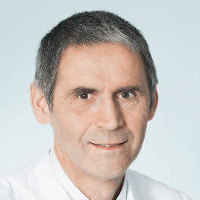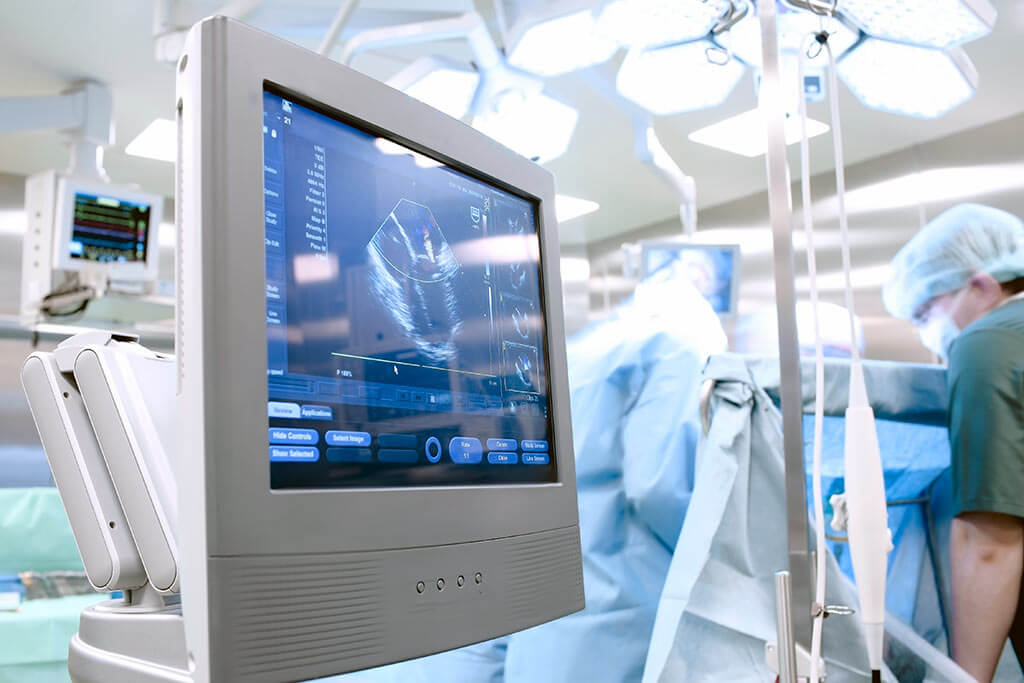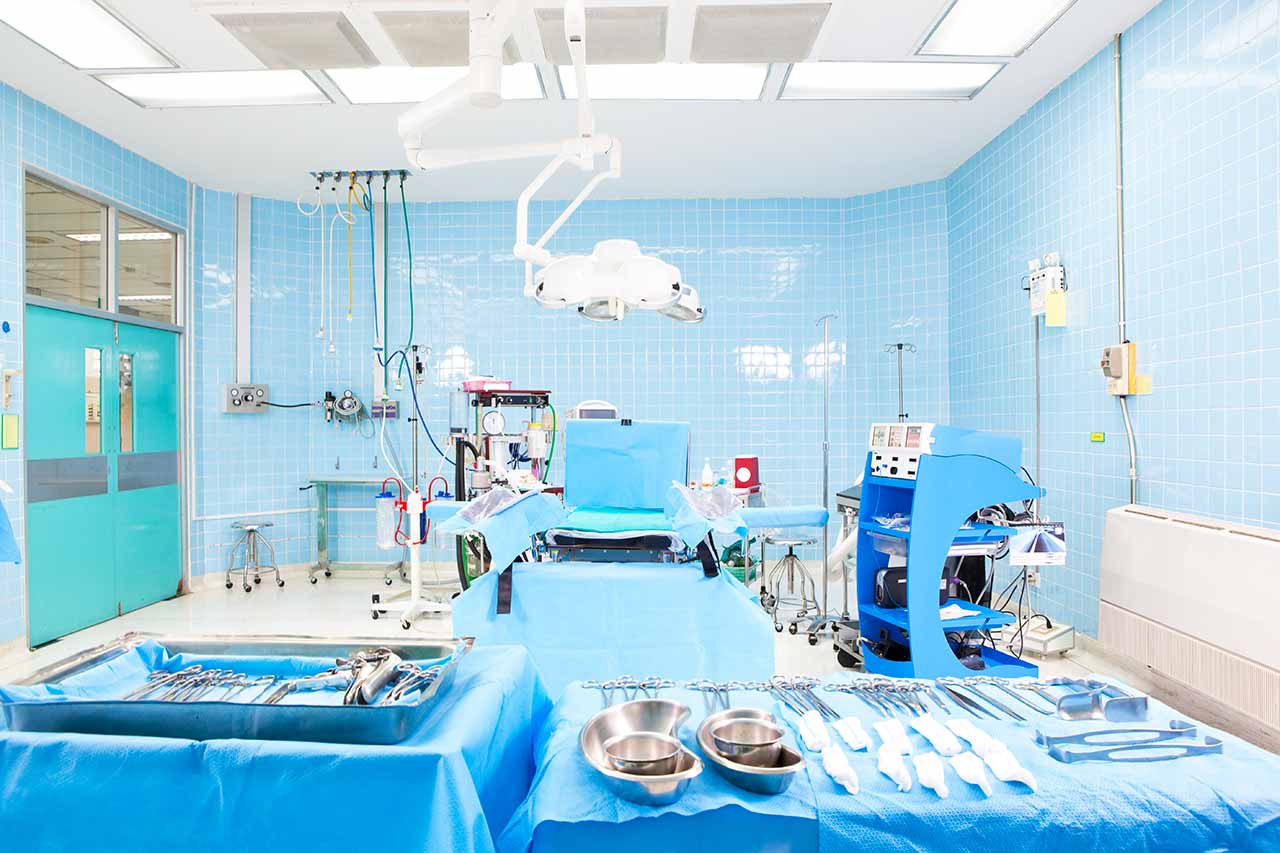
The program includes:
- Initial presentation in the clinic
- clinical history taking
- review of medical records
- physical examination
- laboratory tests:
- complete blood count
- general urine analysis
- biochemical analysis of blood
- TSH-basal, fT3, fT4
- tumor markers
- inflammation indicators
- indicators of blood coagulation
- ultrasound scan
- CT / MRI scan
- 1 course of chemotherapy
- control examinations
- nursing services
- consultations of related specialists
- explanation of individual treatment plan
How program is carried out
During the first visit, the doctor will conduct a clinical examination and go through the results of previous laboratory tests and instrumental examinations. After that, you will undergo an additional examination, including laboratory assessment of liver and kidney function, ultrasound scan. Based on the received results, the doctor will elaborate the chemotherapy regimen. If necessary, related medical specialists will be involved in the elaboration of a treatment regimen (tumor board).
Chemotherapy is carried out as the day hospital procedure, without mandatory admission to the hospital. After the placement of a venous catheter, you will stay in a comfortable ward. An infusion system will be connected to the catheter, through which the required drug or a drug combination will be administered. All drugs are administered by intravenous drip, slowly, so the total duration of the infusion can be up to several hours. All this time, doctors and nurses will monitor your health condition closely.
After the course of chemotherapy, you will stay under medical supervision in the ward for a few more hours. If your general condition is good, your doctor will allow you to leave the hospital. You will receive the medical report with detailed recommendations regarding further treatment. In the future, you will be able to have a distant consultation with your attending physician and schedule the next course of chemotherapy, if necessary.
Required documents
- Medical records
- MRI/CT scan, PET scan (if available)
Service
You may also book:
 BookingHealth Price from:
BookingHealth Price from:
About the department
The Department of Hematology and Oncology at the Hospital Harlaching Munich offers all the options of modern medicine for the diagnostics and treatment of malignant blood diseases, as well as solid tumors of various localization. The department's specialists focus on patients with leukemia, lymphoma, multiple myeloma, lung cancer, breast cancer, cervical and ovarian cancers, kidney, bladder, prostate and testicular cancers. The department's doctors are confident that it is possible to cure oncology only with the help of an interdisciplinary approach, and therefore they cooperate closely with specialists in all related medical fields. During the treatment, not only physical, but also psychological aspects are necessarily taken into account, since in most cases cancer becomes the cause of emotional shock, which the patient can rarely cope with on his own. The department is part of the renowned Cancer Center Munich Süd, and therefore it has access to advanced treatment methods. The patients with end-stage cancer receive effective palliative care to relieve pain and improve their quality of life. The department annually treats more than 1,400 inpatients, while about 750 patients receive outpatient care. Great importance is attached not only to the high quality of medical care, but also to the humane attitude towards the patients and their comfort during treatment. The department is headed by Prof. Dr. med. Meinolf Karthaus.
The department's doctors specialize in the treatment of all types of blood cancer. The focus is on the treatment of acute lymphoblastic leukemia, chronic lymphocytic leukemia, acute myeloid leukemia and chronic myelogenous leukemia. To diagnose and determine the exact type of leukemia, complete blood count and bone marrow assessment are usually sufficient. These tests can be complemented by imaging diagnostics (CT and MRI scans). The comprehensive diagnostics plays a decisive role in the treatment success, since the doctors develop an individual treatment regimen for the patient based on his diagnostic results. The main treatment for all types of leukemia is high-dose chemotherapy. It should be noted that the department's specialists have over 30 years of experience in the field of chemotherapy for various types of blood cancer. The department's therapeutic options also include maintenance therapy, immunotherapy and apheresis. The last-line therapy is autologous or allogeneic bone marrow transplantation, which is carried out in the partner hospitals of the department in Munich. The department also offers supplementary treatments, such as physiotherapy, aromatherapy, occupational therapy, psychological care and naturopathy methods. All these techniques allow the doctors to restore the body's strength and improve the patient's quality of life.
As for solid tumors, the doctors of the medical facility often have to deal with lung cancer, breast cancer, cervical and ovarian cancers, prostate and testicular cancers, kidney cancer, bladder cancer and other malignant tumors. In most cases, when the patient is diagnosed with the above mentioned tumors, he needs a surgical intervention. Since it is quite difficult to achieve cancer remission, patients receive combination therapy. To completely destroy tumor cells, the department's oncologists carry out chemotherapy, radiation therapy, antibody therapy, antihormone therapy, immunotherapy and other therapeutic procedures. It goes without saying that prior to prescribing a particular type of therapy, the interdisciplinary tumor board carefully assesses the advisability of a particular type of treatment, its predicted result, possible side effects and other important factors. When treating cervical and ovarian cancers in women of childbearing age, the doctors always choose the most sparing course of treatment, which will allow the woman to become a mother in the future. In their work, the department's specialists strictly observe the requirements of the German Cancer Society, as well as of the German Society of Hematology and Oncology. Thus, the patients can be confident that they will receive the most effective and sparing treatment. Professional psychological care is an integral part of the therapeutic process as well.
The department's range of medical services includes:
- Diagnostics and treatment of all types of blood cancer (leukemia)
- Diagnostics
- Blood tests
- Bone marrow examinations
- Imaging tests (CT and MRI scans)
- Treatment
- High-dose chemotherapy
- Maintenance therapy
- Immunotherapy
- Apheresis
- Autologous and allogeneic bone marrow transplantation (performed on the basis of partner hospitals in Munich)
- Supplementary treatments (psychological care, physiotherapy, aromatherapy, occupational therapy, naturopathy)
- Diagnostics
- Diagnostics and treatment of lymphomas
- Diagnostics
- Palpatory tests (liver, spleen)
- Blood tests
- Bone marrow examinations
- Biopsy
- Ultrasound scanning
- Computed tomography
- Magnetic resonance imaging
- Positron emission tomography (in cooperation with a partner hospital)
- Treatment
- Classical and high-dose chemotherapy
- Antibody therapy
- Maintenance therapy
- Immunotherapy
- Apheresis
- Autologous and allogeneic bone marrow transplantation (performed on the basis of partner hospitals in Munich)
- Supplementary treatments (psychological care, physiotherapy, aromatherapy, occupational therapy, naturopathy)
- Diagnostics
- Diagnostics and treatment of multiple myeloma
- Diagnostics
- Blood tests
- Biopsy
- Computed tomography
- Magnetic resonance imaging
- Treatment
- High-dose chemotherapy
- Radiation therapy
- Maintenance therapy
- Palliative care
- Apheresis
- Autologous and allogeneic bone marrow transplantation (performed on the basis of partner hospitals in Munich)
- Supplementary treatments (psychological care, physiotherapy, aromatherapy, occupational therapy, naturopathy)
- Diagnostics
- Diagnostics and treatment of lung cancer
- Diagnostics
- Bronchoscopy
- Ultrasound scanning
- X-ray scanning
- Computed tomography
- Magnetic resonance imaging
- Mediastinoscopy
- Biopsy
- Sputum cytology
- Bone scintigraphy
- Tumour marker test
- Diagnostic thoracoscopy or thoracotomy (rarely)
- Positron emission tomography and combined PET-CT (in cooperation with a partner hospital)
- Treatment
- Chemotherapy
- Antibody therapy
- Radiation therapy
- Checkpoint inhibitor therapy
- Thoracic surgery (in cooperation with a partner hospital)
- Maintenance therapy
- Palliative care
- Supplementary treatments (psychological care, physiotherapy, aromatherapy, occupational therapy, naturopathy)
- Diagnostics
- Diagnostics and treatment of breast cancer
- Diagnostics
- Ultrasound scanning
- Computed tomography
- Magnetic resonance imaging
- Mammography
- Bone scintigraphy
- Biopsy
- Treatment
- Surgical removal of the tumor and total mastectomy followed by plastic breast reconstruction
- Radiation therapy
- Chemotherapy
- Antihormone therapy
- Antibody therapy
- Diagnostics
- Diagnostics and treatment of ovarian cancer
- Diagnostics
- Laboratory tests
- Ultrasound scanning
- Computed tomography
- Magnetic resonance imaging
- Biopsy
- Treatment
- Surgical treatment
- Chemotherapy
- Antibody therapy
- Supplementary treatments (psychological care, physiotherapy, aromatherapy, occupational therapy, naturopathy, art therapy)
- Diagnostics
- Diagnostics and treatment of cervical cancer
- Diagnostics
- Laboratory tests
- Ultrasound scanning
- Computed tomography
- Magnetic resonance imaging
- Biopsy
- Positron emission tomography and combined PET-CT (in cooperation with a partner hospital)
- Treatment
- Surgical treatment, including hysterectomy, trachelectomy and total mesometrial resection
- Laparoscopic lymph node removal
- Radiation therapy
- Chemoradiation therapy
- Supplementary treatments (psychological care, physiotherapy, aromatherapy, occupational therapy, naturopathy, art therapy, massage)
- Diagnostics
- Diagnostics and treatment of kidney, bladder and prostate cancer
- Diagnostics
- Ultrasound scanning
- Blood tests
- Urinalysis
- X-ray scanning
- Uroflowmetry
- Treatment
- Surgical treatment (preserving urinary function, if possible)
- Chemotherapy
- Radiation therapy
- HIFU therapy for prostate cancer treatment (in cooperation with the Department of Urology)
- Diagnostics
- Diagnostics and treatment of other cancers, other diagnostic and treatment methods
Curriculum vitae
Higher Education and Professional Career
- 1977 - 1983 Study of Medicine at the Westphalian Wilhelm University of Muenster.
- 1983 State examination and doctoral thesis defense in medicine.
- 1989 Additional specialization in Sports Medicine, Medical Association of Westphalia-Lippe.
- 1990 Qualifying examination in Internal Medicine, Medical Association of Westphalia-Lippe.
- 1993 Specialization in Gastroenterology, Medical Association of Koblenz.
- 1997 Specialization in Hematology and Oncology, Medical Association of Lower Saxony.
- 1999 Habilitation in Internal Medicine, Hannover Medical School.
- 2000 Head of the Department of Palliative Care, Evangelical Hospital Bielefeld.
- 2001 Chief Physician of the Department of Oncology and Palliative Therapy, Bielefeld Evangelical Hospital.
- 2003 Extraordinary Professor, Hannover Medical School.
- 2005 Additional specialization in Infectology, Medical Association of Westphalia-Lippe.
- 2006 Additional specialization in Palliative Care.
- Since 01.09.2007 Chief Physician of the Department of Hematology and Oncology at the Hospital Harlaching Munich.
- Since 01.10.2008 Chief Physician of the Cancer Center Munich-Süd, Hospital Neuperlach Munich and Hospital Harlaching Munich.
Publications
- More than 100 publications in international journals and monographs.
- Over 100 published theses, planning and managing scientific symposia.
- More than 100 reports at regional, national and international congresses.
- Participation in the development of guidelines for the diagnostics and treatment of infections in blood diseases.
- 2000 Editor of the monograph "Symptomatic therapy for cancer patients".
- 2001 Editor of the monograph "Fungal infections in cancer patients", 5th edition 2007.
Сlinical and Research Activities
- Performance of registration clinical trials for the FDA (>25).
- Palliative care for patients with advanced cancer.
- Expert on infectious diseases in national professional societies (Paul Ehrlich Society, German Society for Hematology and Medical Oncology).
- Epidemiology of infectious diseases in immunocompromised patients.
- Diagnostics and treatment of infectious diseases in immunocompromised patients.
- New therapy concepts for immunocompromised patients.
Memberships in Professional Societies
- American Society of Hematology (ASH).
- American Society of Clinical Oncology (ASCO).
- German Society for Hematology and Medical Oncology (DGHO).
- Paul Ehrlich Society (PEG).
- German Society for Infectious Diseases (DGI).
Photo of the doctor: (c) München Klinik Harlaching
About hospital
According to the prestigious Focus magazine, the Hospital Harlaching Munich ranks among the top 20 medical centers in Bavaria, and is also one of the 100 best hospitals in Germany!
The medical complex provides top-class medical care, which meets modern European standards. The medical facility is an Academic Hospital of the Ludwig Maximilian University of Munich, thanks to which it has access to the very latest clinical achievements. The hospital is proud of its large bed capacity, which accounts for more than 700 beds. The doctors of the medical complex annually provide treatment to over 79,000 patients both on an inpatient and outpatient basis. The work of the hospital's medical team is based on an individual approach to each patient, since each patient and his clinical case are unique. The specialists develop individual medical programs, which allow them to achieve complete cure even in particularly complex clinical cases.
The hospital includes 17 specialized departments and many narrowly focused centers, including the Trauma Center, Breast Center, Gynecologic Cancer Center, Level I Perinatal Center, etc. The priority clinical activities of the medical facility include traumatology, neurology, gynecology and obstetrics, oncology, urology, pediatric and adolescent medicine. In addition, the doctors of the medical complex have long experience in the treatment of diseases of the cardiovascular system, kidneys and urinary tract, diseases of the gastrointestinal tract and lungs.
The hospital has been awarded the prestigious DIN EN ISO 9001:2015 certificate, which confirms the excellent quality of medical services and high patient satisfaction with medical care. The successful clinical activities of the hospital are also awarded with certificates from the German Cancer Society, the German Cardiac Society, the German Stroke Society, the German Trauma Society, the German Hernia Society and other specialized medical associations.
The patients of the hospital benefit from medical care by leading doctors in Germany with rich practical experience and excellent qualifications. The specialists devote enough time to personal communication with patients, strive to establish trust with them and do everything possible to ensure not only a successful treatment outcome, but also a pleasant stay in the hospital.
Photo: (с) depositphotos
Accommodation in hospital
Patients rooms
The patients of the Hospital Harlaching Munich live in comfortable single and double rooms with light colors. Each patient room has an ensuite bathroom with shower and toilet. The standard patient room furnishings include an automatically adjustable bed, a bedside table, a wardrobe, a table and chairs for receiving visitors. The bed has a built-in modern multimedia system with the help of which the patient can control the TV and radio. In addition, the multimedia system can be used to make telephone calls. Wi-Fi access is also available in the hospital. There is a ban on smoking in the hospital.
The patients can also live in enhanced comfort rooms. These patient rooms have additional toiletries, towels, hairdryer, safe, mini-fridge and upholstered furniture.
The hospital has a library with a wide selection of books for every taste, including audio books, magazines, DVDs and CDs.
The hospital also has a cozy cafe where the patients can have a tasty snack, enjoy a cup of aromatic coffee or hot tea with dessert.
Meals and Menus
The patient and the accompanying person are offered tasty and healthy three meals a day. The diet is quite varied. The restaurant of the hospital is certified in accordance with the DIN ISO 22000: 2005 quality standards, so the patients can be sure that when cooking the chefs use only the freshest and highest quality products.
If you are on a specific diet for some reason, you will be offered an individual menu. Please inform the medical staff about your dietary preferences prior to the treatment.
Further details
Standard rooms include:
Religion
The religious services are available upon request.
Accompanying person
During the inpatient program, the accompanying person can live with the patient in a patient room or a hotel of his choice. Our managers will help you choose the most suitable option.
Hotel
During the outpatient program, the patient can stay at the hotel of his choice. Our managers will help you choose the most suitable option.




